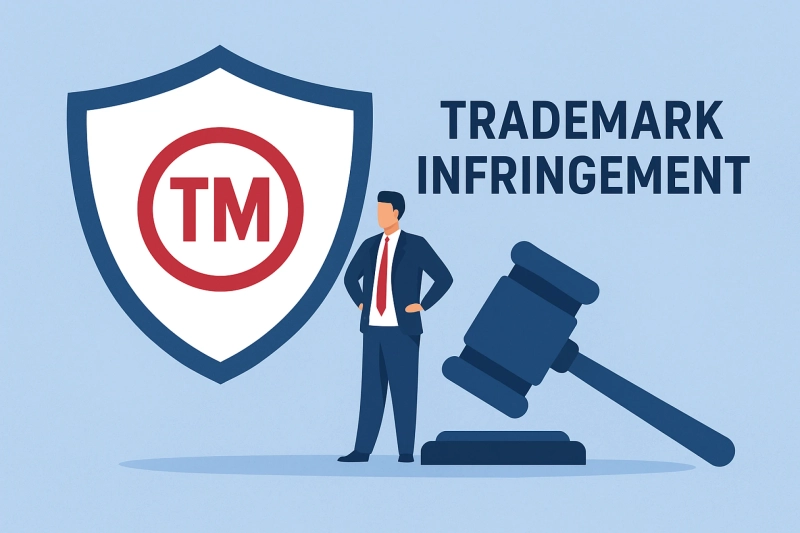A trademark is more than a logo or a name. It represents the identity and reputation of a business in the market. When another party uses a similar or identical mark without permission, it leads to infringement of trademark. Such misuse not only causes confusion among consumers but also weakens brand value. In India, laws around trademark infringement are strict, offering protection and remedies to rightful owners.
What is Trademark Infringement?
Trademark infringement occurs when an unauthorised party uses a registered mark, or a deceptively similar one, for goods or services without the consent of the trademark owner.
Examples include:
- Selling products under a brand name deceptively similar to a well-known trademark.
- Using a similar logo, packaging, or trade dress that misleads consumers.
- Offering services under a confusingly similar mark.
This leads to dilution of brand identity and potential loss of revenue.
Trademark Infringement in India: Legal Framework
Trademark protection in India is governed by the Trade Marks Act, 1999. The Act provides owners with exclusive rights and ensures that any infringement can be challenged through civil and criminal remedies.
Key provisions under Indian law:
- Exclusive rights to use the registered trademark.
- Protection against unauthorised or confusingly similar marks.
- Legal remedies, including injunctions, damages, and imprisonment for offenders.
Types of Trademark Infringement
- Direct Infringement – Using a mark identical or deceptively similar to a registered trademark.
- Indirect Infringement – Contributing to or enabling infringement, such as selling counterfeit goods.
- Passing Off – Protecting unregistered marks where misrepresentation causes damage to goodwill.
Consequences of Trademark Infringement in India
The effects of infringement go beyond financial loss. Some key consequences are:
- Brand Dilution – Weakening of brand identity due to market confusion.
- Revenue Loss – Customers may buy counterfeit products, leading to reduced profits.
- Reputational Damage – Inferior quality of infringing products can harm consumer trust.
- Legal Costs – Defending the brand often involves litigation expenses.
Trademark Infringement Lawsuit: Remedies Available
Trademark owners in India can initiate a trademark infringement lawsuit seeking relief in the following ways:
Civil Remedies
- Injunctions – Court orders stopping further use of the infringing mark.
- Damages/Account of Profits – Compensation for losses or surrender of unlawful profits.
- Delivery of Goods – Seizure and destruction of counterfeit products.
Criminal Remedies
- Imprisonment for offenders (6 months to 3 years).
- Monetary fines ranging from ₹50,000 to ₹2,00,000.
- Seizure of goods bearing the infringing mark.
These strict measures serve as a deterrent to misuse and protect the interests of rightful trademark holders.
Preventing Trademark Infringement
To safeguard business interests, owners should:
- Register their trademark with the Indian Trademark Registry.
- Monitor the market for unauthorised use.
- Issue cease-and-desist notices when infringement is detected.
- Take timely legal action to avoid further damage.
Why Choose AMD LAW INDIA for Trademark Protection
Trademark disputes require a blend of legal expertise and practical enforcement. AMD LAW INDIA provides end-to-end services, from trademark registration to infringement lawsuits, ensuring clients’ brands are fully protected under Indian law. The firm’s team offers strategic guidance and representation to enforce rights effectively.
FAQs on Trademark Infringement in India
Q1: What constitutes infringement of trademark in India?
Using an identical or deceptively similar mark for similar goods or services without the owner’s consent amounts to infringement.
Q2: What is the difference between infringement and passing off?
Infringement applies to registered marks, while passing off protects unregistered marks based on goodwill and reputation.
Q3: How do I file a trademark infringement lawsuit in India?
A lawsuit can be filed in a District Court or High Court with jurisdiction, seeking injunctions, damages, and other remedies.
Q4: What penalties are imposed for trademark infringement?
Penalties include imprisonment (6 months to 3 years) and fines (₹50,000 to ₹2,00,000), along with civil damages.
Q5: Why hire a professional law firm for trademark disputes?
Experienced firms like AMD LAW INDIA ensure accurate filings, strong legal representation, and timely enforcement of rights.



